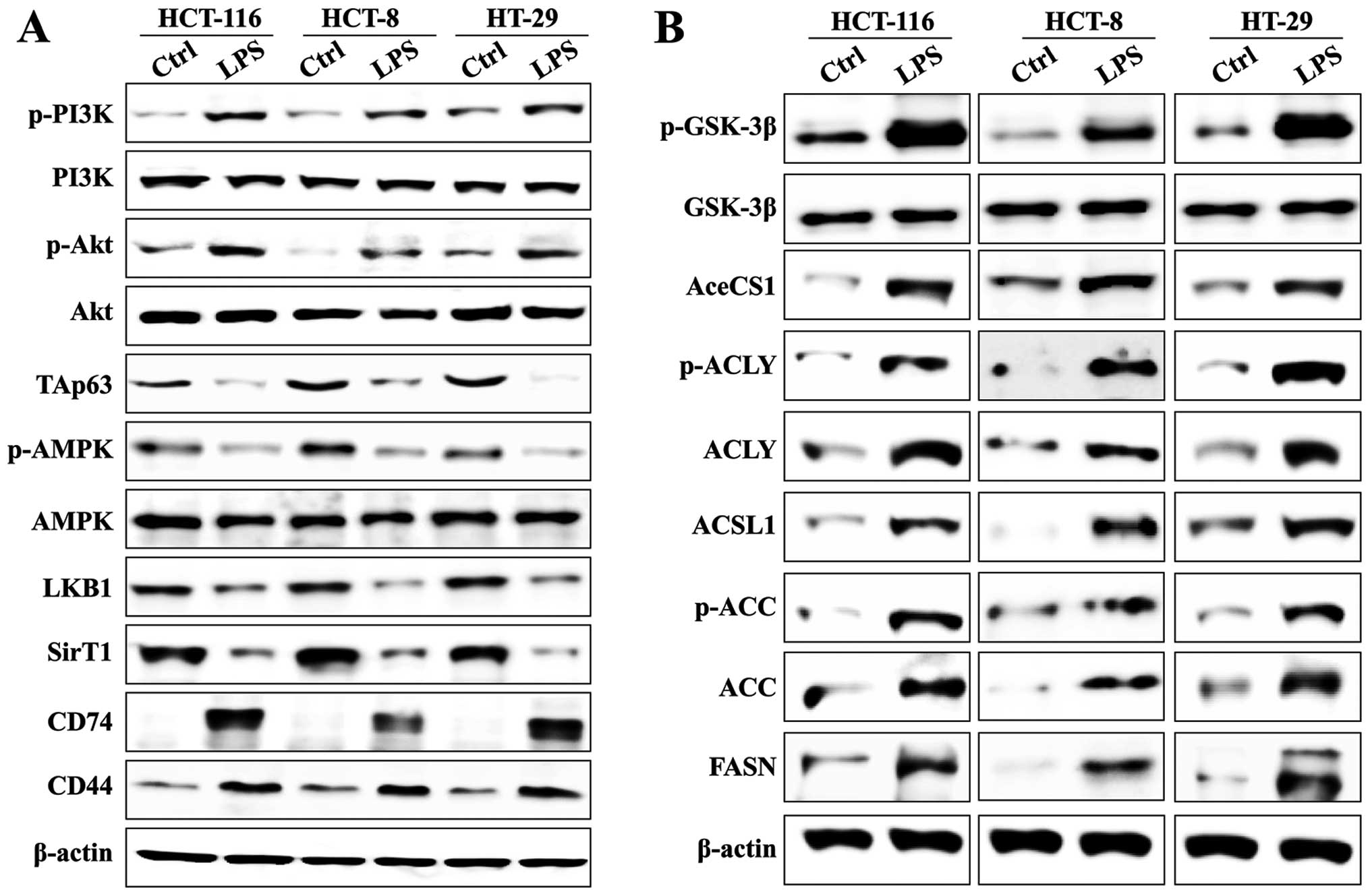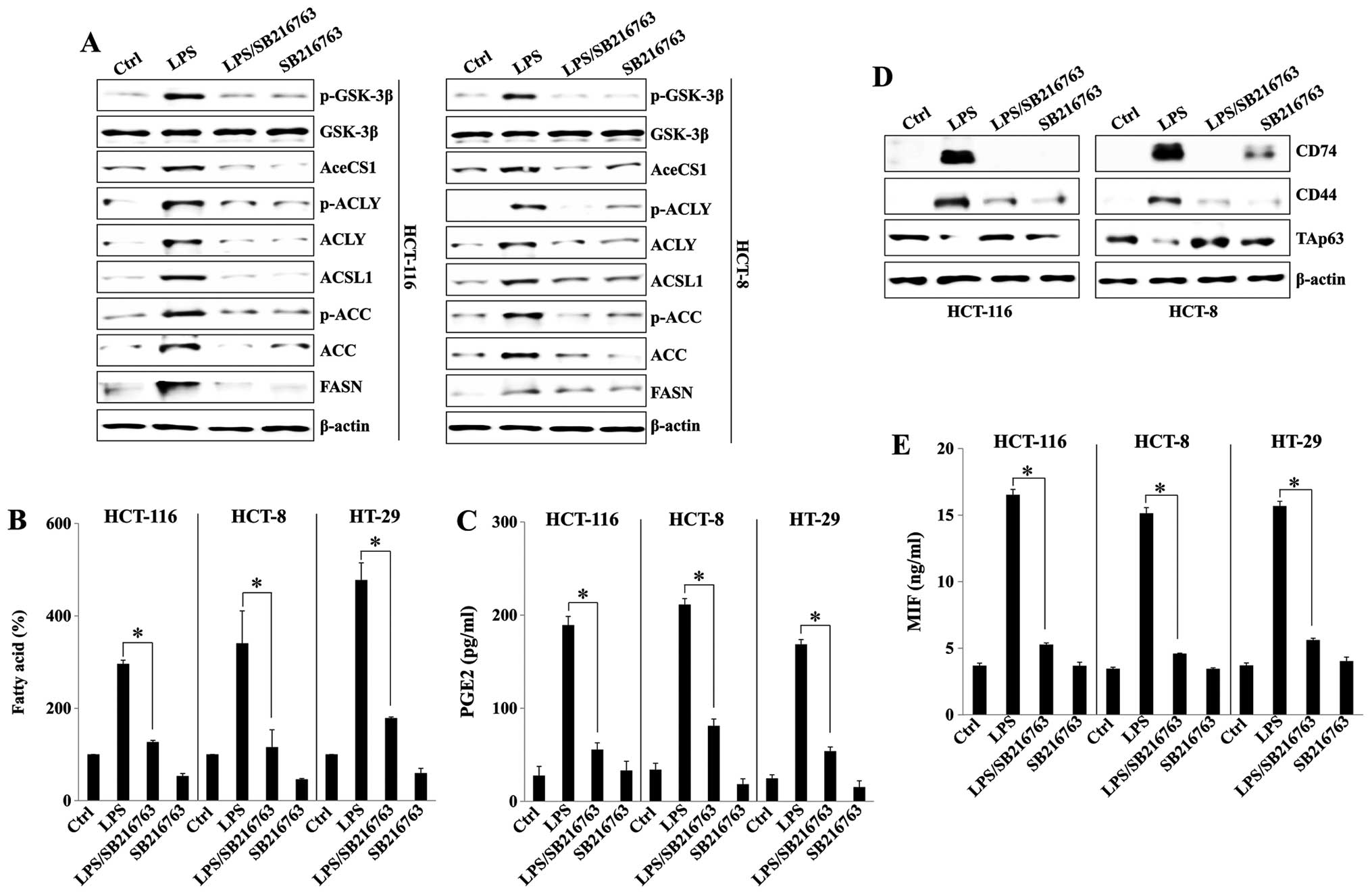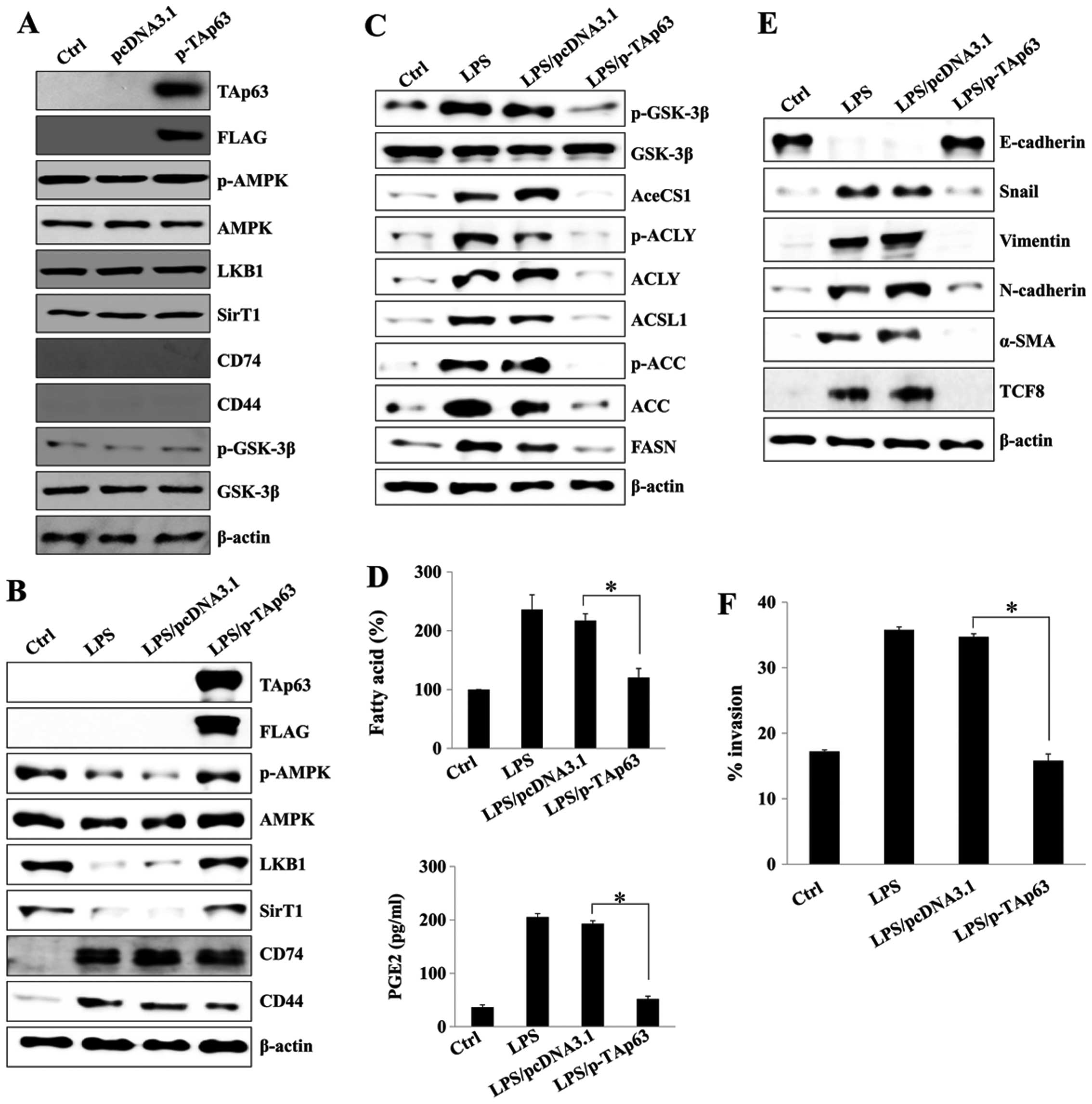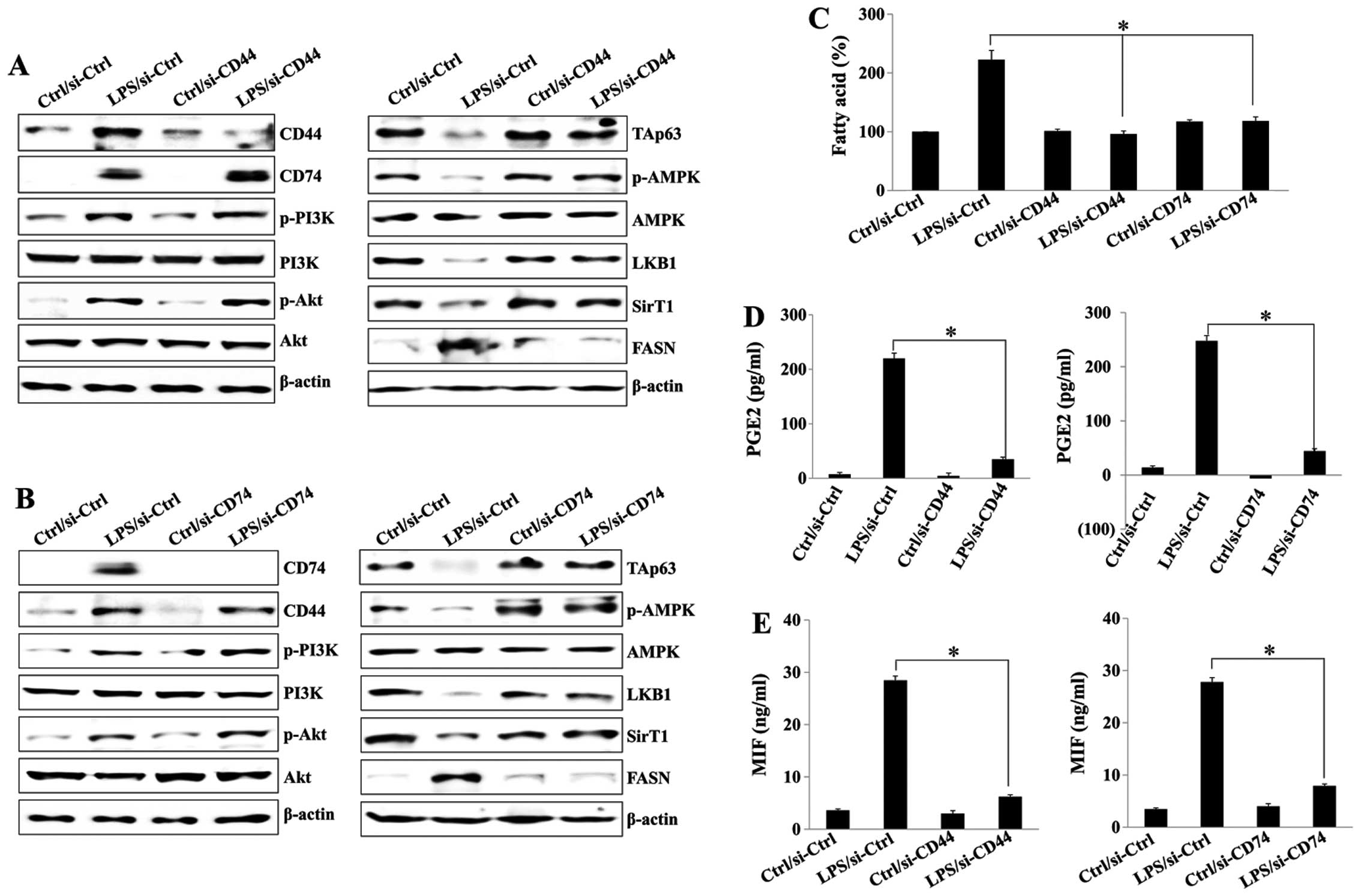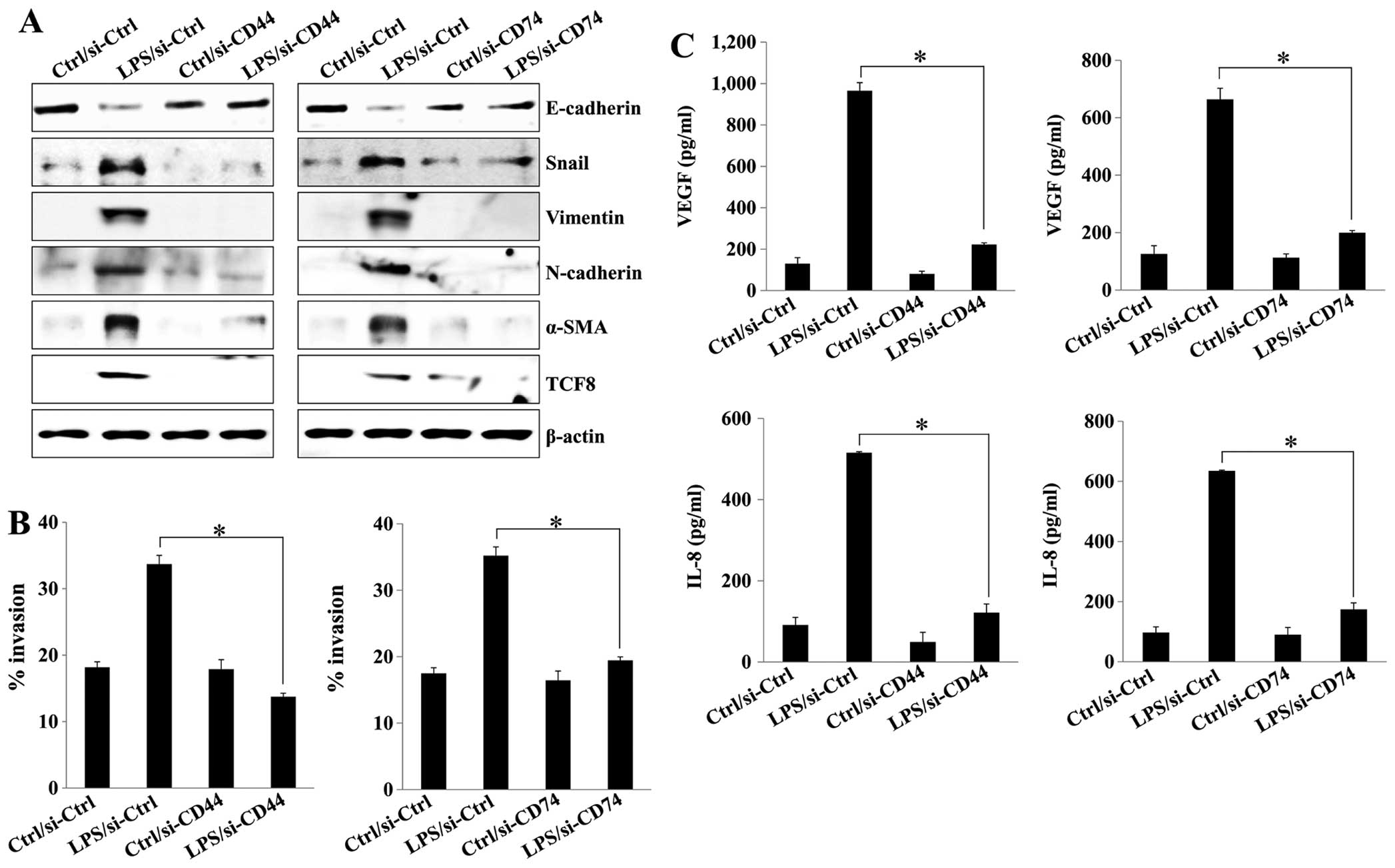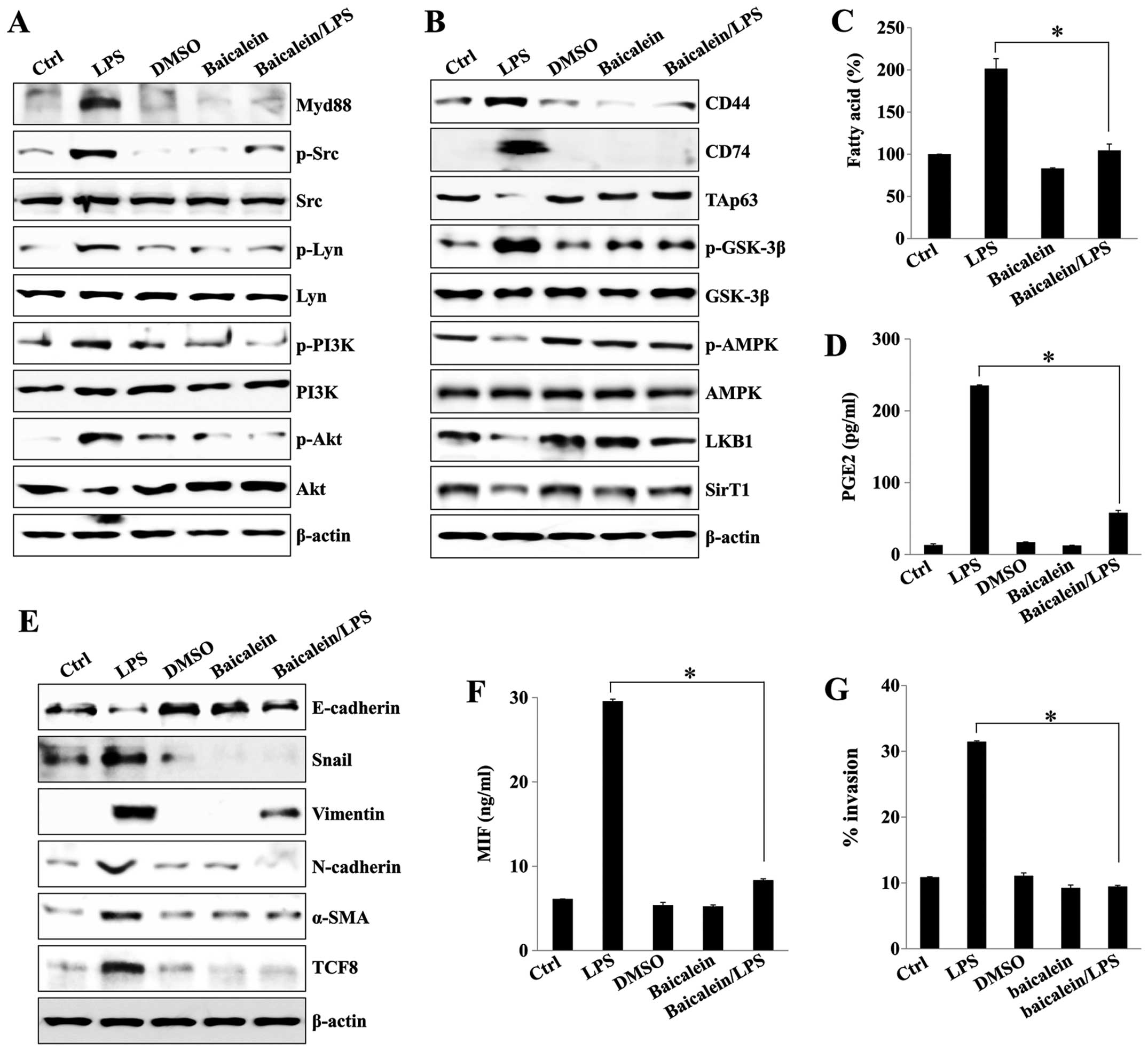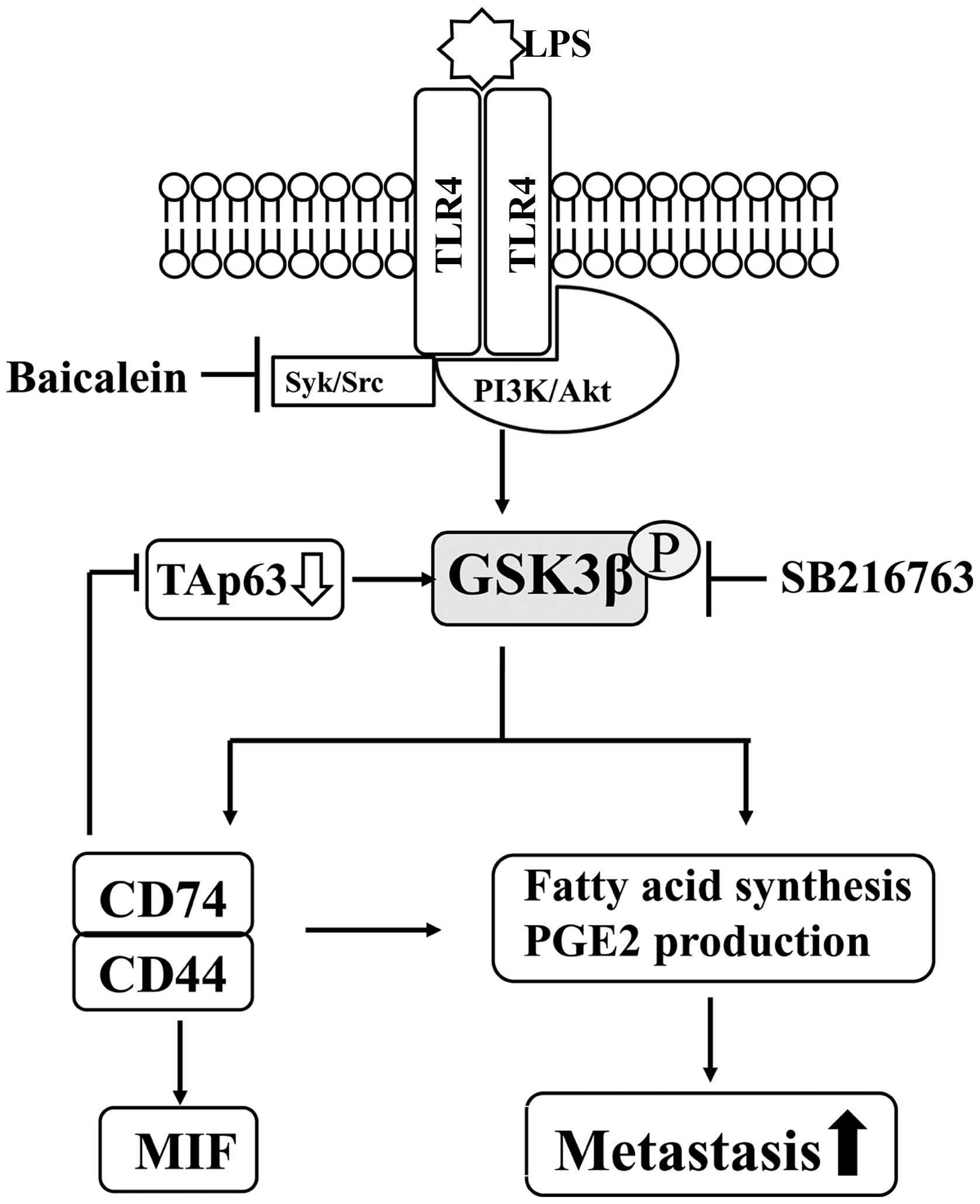|
1
|
Amar S, Belmaker RH and Agam G: The
possible involvement of glycogen synthase kinase-3 (GSK-3) in
diabetes, cancer and central nervous system diseases. Curr Pharm
Des. 17:2264–2277. 2011. View Article : Google Scholar : PubMed/NCBI
|
|
2
|
Qu L, Huang S, Baltzis D, Rivas-Estilla
AM, Pluquet O, Hatzoglou M, Koumenis C, Taya Y, Yoshimura A and
Koromilas AE: Endoplasmic reticulum stress induces p53 cytoplasmic
localization and prevents p53-dependent apoptosis by a pathway
involving glycogen synthase kinase-3beta. Genes Dev. 18:261–277.
2004. View Article : Google Scholar : PubMed/NCBI
|
|
3
|
Charvet C and Maurer U: GSK-3 turns p53
deadly. Cell Cycle. 10:3621–3622. 2011. View Article : Google Scholar : PubMed/NCBI
|
|
4
|
Kim NH, Kim HS, Li XY, Lee I, Choi HS,
Kang SE, Cha SY, Ryu JK, Yoon D, Fearon ER, et al: A p53/miRNA-34
axis regulates Snail1-dependent cancer cell epithelial-mesenchymal
transition. J Cell Biol. 195:417–433. 2011. View Article : Google Scholar : PubMed/NCBI
|
|
5
|
Cha YH, Kim NH, Park C, Lee I, Kim HS and
Yook JI: MiRNA-34 intrinsically links p53 tumor suppressor and Wnt
signaling. Cell Cycle. 11:1273–1281. 2012. View Article : Google Scholar : PubMed/NCBI
|
|
6
|
Sadot E, Geiger B, Oren M and Ben-Ze'ev A:
Down-regulation of beta-catenin by activated p53. Mol Cell Biol.
21:6768–6781. 2001. View Article : Google Scholar : PubMed/NCBI
|
|
7
|
Wong AS and Gumbiner BM:
Adhesion-independent mechanism for suppression of tumor cell
invasion by E-cadherin. J Cell Biol. 161:1191–1203. 2003.
View Article : Google Scholar : PubMed/NCBI
|
|
8
|
Yang A and McKeon F: P63 and P73: P53
mimics, menaces and more. Nat Rev Mol Cell Biol. 1:199–207. 2000.
View Article : Google Scholar
|
|
9
|
Gressner O, Schilling T, Lorenz K, Schulze
Schleithoff E, Koch A, Schulze-Bergkamen H, Lena AM, Candi E,
Terrinoni A, Catani MV, et al: TAp63alpha induces apoptosis by
activating signaling via death receptors and mitochondria. EMBO J.
24:2458–2471. 2005. View Article : Google Scholar : PubMed/NCBI
|
|
10
|
Yang A, Kaghad M, Caput D and McKeon F: On
the shoulders of giants: p63, p73 and the rise of p53. Trends
Genet. 18:90–95. 2002. View Article : Google Scholar : PubMed/NCBI
|
|
11
|
Urist MJ, Di Como CJ, Lu ML, Charytonowicz
E, Verbel D, Crum CP, Ince TA, McKeon FD and Cordon-Cardo C: Loss
of p63 expression is associated with tumor progression in bladder
cancer. Am J Pathol. 161:1199–1206. 2002. View Article : Google Scholar : PubMed/NCBI
|
|
12
|
Koga F, Kawakami S, Fujii Y, Saito K,
Ohtsuka Y, Iwai A, Ando N, Takizawa T, Kageyama Y and Kihara K:
Impaired p63 expression associates with poor prognosis and
uroplakin III expression in invasive urothelial carcinoma of the
bladder. Clin Cancer Res. 9:5501–5507. 2003.PubMed/NCBI
|
|
13
|
Zheng YX, Yang M, Rong TT, Yuan XL, Ma YH,
Wang ZH, Shen LS and Cui L: CD74 and macrophage migration
inhibitory factor as therapeutic targets in gastric cancer. World J
Gastroenterol. 18:2253–2261. 2012. View Article : Google Scholar : PubMed/NCBI
|
|
14
|
Maharshak N, Cohen S, Lantner F, Hart G,
Leng L, Bucala R and Shachar I: CD74 is a survival receptor on
colon epithelial cells. World J Gastroenterol. 16:3258–3266. 2010.
View Article : Google Scholar : PubMed/NCBI
|
|
15
|
Gold DV, Stein R, Burton J and Goldenberg
DM: Enhanced expression of CD74 in gastrointestinal cancers and
benign tissues. Int J Clin Exp Pathol. 4:1–12. 2010.
|
|
16
|
Shachar I and Haran M: The secret second
life of an innocent chaperone: The story of CD74 and B cell/chronic
lymphocytic leukemia cell survival. Leuk Lymphoma. 52:1446–1454.
2011. View Article : Google Scholar : PubMed/NCBI
|
|
17
|
Su X, Gi YJ, Chakravarti D, Chan IL, Zhang
A, Xia X, Tsai KY and Flores ER: TAp63 is a master transcriptional
regulator of lipid and glucose metabolism. Cell Metab. 16:511–525.
2012. View Article : Google Scholar : PubMed/NCBI
|
|
18
|
Notarnicola M, Tutino V, Calvani M,
Lorusso D, Guerra V and Caruso MG: Serum levels of fatty acid
synthase in colorectal cancer patients are associated with tumor
stage. J Gastrointest Cancer. 43:508–511. 2012. View Article : Google Scholar
|
|
19
|
D'Erchia AM, Tullo A, Lefkimmiatis K,
Saccone C and Sbisà E: The fatty acid synthase gene is a conserved
p53 family target from worm to human. Cell Cycle. 5:750–758. 2006.
View Article : Google Scholar : PubMed/NCBI
|
|
20
|
Visca P, Sebastiani V, Pizer ES, Botti C,
De Carli P, Filippi S, Monaco S and Alo PL: Immunohistochemical
expression and prognostic significance of FAS and GLUT1 in bladder
carcinoma. Anticancer Res. 23(1A): 335–339. 2003.PubMed/NCBI
|
|
21
|
Alò PL, Visca P, Botti C, Galati GM,
Sebastiani V, Andreano T, Di Tondo U and Pizer ES:
Immunohistochemical expression of human erythrocyte glucose
transporter and fatty acid synthase in infiltrating breast
carcinomas and adjacent typical/atypical hyperplastic or normal
breast tissue. Am J Clin Pathol. 116:129–134. 2001. View Article : Google Scholar : PubMed/NCBI
|
|
22
|
Terrand J, Bruban V, Zhou L, Gong W, El
Asmar Z, May P, Zurhove K, Haffner P, Philippe C, Woldt E, et al:
LRP1 controls intracellular cholesterol storage and fatty acid
synthesis through modulation of Wnt signaling. J Biol Chem.
284:381–388. 2009. View Article : Google Scholar :
|
|
23
|
Cammarota R, Bertolini V, Pennesi G, Bucci
EO, Gottardi O, Garlanda C, Laghi L, Barberis MC, Sessa F, Noonan
DM, et al: The tumor microenvironment of colorectal cancer: Stromal
TLR-4 expression as a potential prognostic marker. J Transl Med.
8:1122010. View Article : Google Scholar : PubMed/NCBI
|
|
24
|
Doan HQ, Bowen KA, Jackson LA and Evers
BM: Toll-like receptor 4 activation increases Akt phosphorylation
in colon cancer cells. Anticancer Res. 29:2473–2478.
2009.PubMed/NCBI
|
|
25
|
Hsu RY, Chan CH, Spicer JD, Rousseau MC,
Giannias B, Rousseau S and Ferri LE: LPS-induced TLR4 signaling in
human colorectal cancer cells increases beta1 integrin-mediated
cell adhesion and liver metastasis. Cancer Res. 71:1989–1998. 2011.
View Article : Google Scholar : PubMed/NCBI
|
|
26
|
Gong R, Rifai A and Dworkin LD: Activation
of PI3K-Akt-GSK3beta pathway mediates hepatocyte growth factor
inhibition of RANTES expression in renal tubular epithelial cells.
Biochem Biophys Res Commun. 330:27–33. 2005. View Article : Google Scholar : PubMed/NCBI
|
|
27
|
Earl TM, Nicoud IB, Pierce JM, Wright JP,
Majoras NE, Rubin JE, Pierre KP, Gorden DL and Chari RS: Silencing
of TLR4 decreases liver tumor burden in a murine model of
colorectal metastasis and hepatic steatosis. Ann Surg Oncol.
16:1043–1050. 2009. View Article : Google Scholar : PubMed/NCBI
|
|
28
|
Jing YY, Han ZP, Sun K, Zhang SS, Hou J,
Liu Y, Li R, Gao L, Zhao X, Zhao QD, et al: Toll-like receptor 4
signaling promotes epithelial-mesenchymal transition in human
hepatocellular carcinoma induced by lipopolysaccharide. BMC Med.
10:982012. View Article : Google Scholar : PubMed/NCBI
|
|
29
|
Shao J, Jung C, Liu C and Sheng H:
Prostaglandin E2 Stimulates the beta-catenin/T cell
factor-dependent transcription in colon cancer. J Biol Chem.
280:26565–26572. 2005. View Article : Google Scholar : PubMed/NCBI
|
|
30
|
Chung H, Choi HS, Seo EK, Kang DH and Oh
ES: Baicalin and baicalein inhibit transforming growth
factor-β1-mediated epithelial-mesenchymal transition in human
breast epithelial cells. Biochem Biophys Res Commun. 458:707–713.
2015. View Article : Google Scholar : PubMed/NCBI
|
|
31
|
Park GB, Kim YS, Lee HK, Yang JW, Kim D
and Hur DY: ASK1/JNK-mediated TAp63 activation controls the cell
survival signal of baicalein-treated EBV-transformed B cells. Mol
Cell Biochem. 412:247–258. 2016. View Article : Google Scholar
|
|
32
|
Pu P, Wang XA, Salim M, Zhu LH, Wang L,
Chen KJ, Xiao JF, Deng W, Shi HW, Jiang H, et al: Baicalein, a
natural product, selectively activating AMPKα2 and
ameliorates metabolic disorder in diet-induced mice. Mol Cell
Endocrinol. 362:128–138. 2012. View Article : Google Scholar : PubMed/NCBI
|
|
33
|
Jing Y, Han Z, Zhang S, Liu Y and Wei L:
Epithelial-mesenchymal transition in tumor microenvironment. Cell
Biosci. 1:292011. View Article : Google Scholar : PubMed/NCBI
|
|
34
|
Rakoff-Nahoum S and Medzhitov R: Toll-like
receptors and cancer. Nat Rev Cancer. 9:57–63. 2009. View Article : Google Scholar
|
|
35
|
Barbieri CE, Tang LJ, Brown KA and
Pietenpol JA: Loss of p63 leads to increased cell migration and
up-regulation of genes involved in invasion and metastasis. Cancer
Res. 66:7589–7597. 2006. View Article : Google Scholar : PubMed/NCBI
|
|
36
|
Shimada Y, Ishii G, Nagai K, Atsumi N,
Fujii S, Yamada A, Yamane Y, Hishida T, Nishimura M, Yoshida J, et
al: Expression of podoplanin, CD44, and p63 in squamous cell
carcinoma of the lung. Cancer Sci. 100:2054–2059. 2009. View Article : Google Scholar : PubMed/NCBI
|
|
37
|
Wang TY, Chen BF, Yang YC, Chen H, Wang Y,
Cviko A, Quade BJ, Sun D, Yang A, McKeon FD, et al: Histologic and
immunophenotypic classification of cervical carcinomas by
expression of the p53 homologue p63: A study of 250 cases. Hum
Pathol. 32:479–486. 2001. View Article : Google Scholar : PubMed/NCBI
|
|
38
|
D'Aguanno S, Barcaroli D, Rossi C,
Zucchelli M, Ciavardelli D, Cortese C, De Cola A, Volpe S,
D'Agostino D, Todaro M, et al: p63 isoforms regulate metabolism of
cancer stem cells. J Proteome Res. 13:2120–2136. 2014. View Article : Google Scholar : PubMed/NCBI
|
|
39
|
Zaytseva YY, Rychahou PG, Gulhati P,
Elliott VA, Mustain WC, O'Connor K, Morris AJ, Sunkara M, Weiss HL,
Lee EY, et al: Inhibition of fatty acid synthase attenuates
CD44-associated signaling and reduces metastasis in colorectal
cancer. Cancer Res. 72:1504–1517. 2012. View Article : Google Scholar : PubMed/NCBI
|
|
40
|
Long QQ, Yi YX, Qiu J, Xu CJ and Huang PL:
Fatty acid synthase (FASN) levels in serum of colorectal cancer
patients: Correlation with clinical outcomes. Tumour Biol.
35:3855–3859. 2014. View Article : Google Scholar : PubMed/NCBI
|
|
41
|
Murata S, Yanagisawa K, Fukunaga K, Oda T,
Kobayashi A, Sasaki R and Ohkohchi N: Fatty acid synthase inhibitor
cerulenin suppresses liver metastasis of colon cancer in mice.
Cancer Sci. 101:1861–1865. 2010. View Article : Google Scholar : PubMed/NCBI
|
|
42
|
Salim T, Sjölander A and Sand-Dejmek J:
Nuclear expression of glycogen synthase kinase-3β and lack of
membranous β-catenin is correlated with poor survival in colon
cancer. Int J Cancer. 133:807–815. 2013. View Article : Google Scholar : PubMed/NCBI
|
|
43
|
Towler MC and Hardie DG: AMP-activated
protein kinase in metabolic control and insulin signaling. Circ
Res. 100:328–341. 2007. View Article : Google Scholar : PubMed/NCBI
|
|
44
|
Roche PA, Teletski CL, Stang E, Bakke O
and Long EO: Cell surface HLA-DR-invariant chain complexes are
targeted to endosomes by rapid internalization. Proc Natl Acad Sci
USA. 90:8581–8585. 1993. View Article : Google Scholar : PubMed/NCBI
|
|
45
|
Gee K, Lim W, Ma W, Nandan D, Diaz-Mitoma
F, Kozlowski M and Kumar A: Differential regulation of CD44
expression by lipopolysaccharide (LPS) and TNF-alpha in human
monocytic cells: Distinct involvement of c-Jun N-terminal kinase in
LPS-induced CD44 expression. J Immunol. 169:5660–5672. 2002.
View Article : Google Scholar : PubMed/NCBI
|
|
46
|
Borghese F and Clanchy FI: CD74: An
emerging opportunity as a therapeutic target in cancer and
autoimmune disease. Expert Opin Ther Targets. 15:237–251. 2011.
View Article : Google Scholar : PubMed/NCBI
|
|
47
|
Santaolalla R, Sussman DA, Ruiz JR, Davies
JM, Pastorini C, España CL, Sotolongo J, Burlingame O, Bejarano PA,
Philip S, et al: TLR4 activates the β-catenin pathway to cause
intestinal neoplasia. PLoS One. 8:e632982013. View Article : Google Scholar
|
|
48
|
Chung YH and Kim D: Enhanced TLR4
expression on colon cancer cells after chemotherapy promotes cell
survival and epithelial-mesenchymal transition through
phosphorylation of GSK-3β. Anticancer Res. 36:3383–3394.
2016.PubMed/NCBI
|















